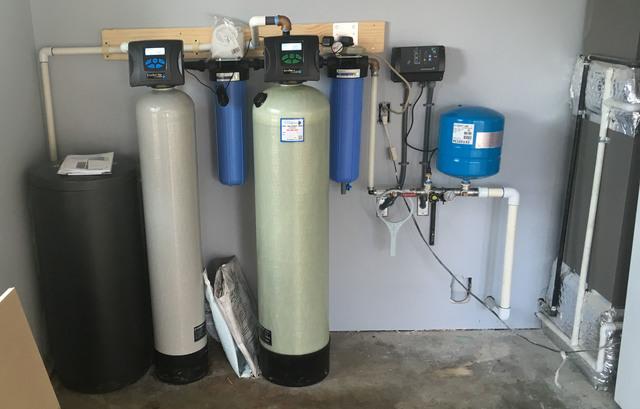Call This Wednesday to Get $25 OFF
Clean Solutions, Dirty Jobs – Done Right. Reliable. Responsive. Remarkable.
Call This Wednesday to Get $25 OFF
Clean Solutions, Dirty Jobs – Done Right. Reliable. Responsive. Remarkable.
Water with a high mineral composition is called hard water. The higher the calcium and magnesium content, the higher the degree of water hardness. Though hard water does not pose serious health hazards, it can interfere with cleaning as hard water may form a chalky film on glass, shower doors, sinks, faucets, and so forth.
If you have a septic system installed on your property, then the possible negative effects of hard water can be even more serious. Even water softeners, the solution for hard water, can have an affect on the septic system. This article brought to you by Septic Connection will go over just that: the impact of water softeners on septic systems. Call Septic Connection if you have any specific questions or concerns.

A water softener is a fairly simple system that treats hard water. This system has two primary components: a softener tank and a brine tank.
As water passes through the softener tank, the positively charged minerals such as calcium, magnesium, iron, and sodium attach to the negatively charged tank. The softened water then continues through the plumbing system and is distributed throughout your building.
Every three to four days, the water softener draws salt water from the brine tank to negatively charge the softener tank and release the positively charged minerals. As the minerals are released, they are flushed out of the system through the plumbing system. In your case, they would flush through the septic system.
There are two septic tank issues that result from water softeners: system overload and clogging.
The flushing process that happens once to twice a week uses between 50 to 150 gallons of brine solution (salt water). That is the equivalent of several showers. The sudden influx of water can overwhelm the septic system, especially if the release occurs when your laundry machine or dishwasher is running. The result can be water or sewage backups, or an overwhelmed drain field.
Secondly, the salt water is particularly harmful for the septic system because salt water is significantly heavier than fresh water. When the salt water enters the septic tank, it will rapidly sink to the bottom, sometimes even lifting the sludge and suspending it in the effluent along with the scum layer. This can allow sludge to flow out into the drain field, causing clogs in the pipes and foul odors in the field.
Most homes that rely on a septic system also rely on private water wells to supply the building with water. This water supply tends to contain high mineral content which calls for a water softener. So, we cannot tell you not to install a water softener. Rather, we recommend that the water softener is installed to discharge outside of the plumbing system. This can be into the storm drain or downspout.
The septic system is an onsite waste treatment facility, and it is incredibly reliable. However, the system is only as effective…
Imagine flushing your toilet and then suddenly realizing that your backyard has turned into a swampy mess. This unpleasant experience is…
Soil testing is a critical step in various construction and environmental projects. It provides essential information about the ground conditions, which…
Grease traps are remarkable tools that help keep your establishment clean and free from bad odors. Septic Connection has a…
If you have just moved into a new home or property that relies on a septic system for waste and wastewater…
If you have any questions or concerns, or if you would like to hire a septic professional, then call Septic Connection. Our professionals have plenty of experience with septic systems and water softeners.
Many septic system failures do not happen overnight. They develop quietly, over months or even years, until a small issue becomes an expensive emergency. That is why routine septic maintenance…
Read moreA properly functioning septic system is essential for protecting your home, property, and local environment. Unfortunately, many homeowners only think about their septic system when something goes wrong. As a…
Read more